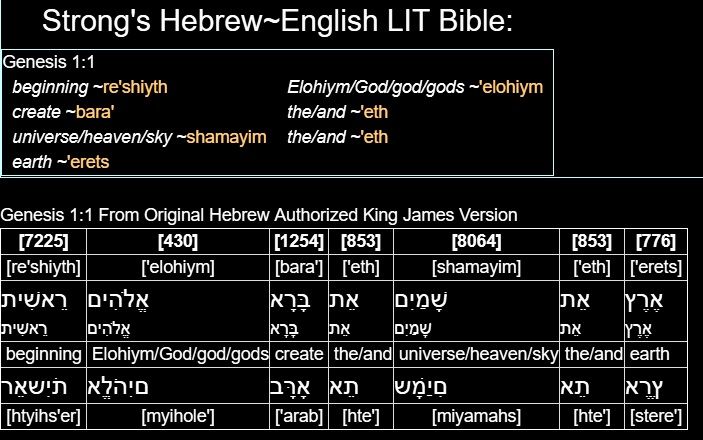| [1161] | [2491] | [611] | [2036] | [1988] | [1492] | [5100] | [1544] | [1140] | [1909] | [4675] | [3686] | [2532] | [2967] | [846] | [3754] | [190] | [3756] | [3326] | [2257] |
|---|---|---|---|---|---|---|---|---|---|---|---|---|---|---|---|---|---|---|---|
| [de] | [Ioannes] | [apokrinomai] | [epo] | [epistates] | [eido] | [tis] | [ekballo] | [daimonion] | [epi] | [sou] | [onoma] | [kai] | [koluo] | [autos] | [hoti] | [akoloutheo] | [ou] | [meta] | [hemon] |
| δέ | Ἰωάννης | ἀποκρίνομαι | ἔπω | ἐπιστάτης | εἴδω | τὶς | ἐκβάλλω | δαιμόνιον | ἐπί | σοῦ | ὄνομα | καί | κωλύω | αὐτός | ὅτι | ἀκολουθέω | οὐ | μετά | ἡμῶν |
| also, and, but, moreover, now | John | answer | answer, bid, bring word, call, command.. | master | be aware, behold, X can (+ not tell), .. | a (kind of), any (man, thing, thing at.. | bring forth, cast (forth, out), drive .. | devil, god | about (the times), above, after, again.. | X home, thee, thine (own), thou, thy | called, (+ sur-)name(-d | and, also, both, but, even, for, if, o.. | forbid, hinder, keep from, let, not su.. | her, it(-self), one, the other, (mine).. | as concerning that, as though, because.. | follow, reach | long, nay, neither, never, no (X man).. | after(-ward), X that he again, against.. | our (company), us, we |
| έδ | ςηννάωἸ | ιαμονίρκοπἀ | ωπἔ | ςητάτσιπἐ | ωδἴε | ςὶτ | ωλλάβκἐ | νοινόμιαδ | ίπἐ | ῦοσ | αμονὄ | ίακ | ωύλωκ | ςότὐα | ιτὅ | ωέθυολοκἀ | ὐο | άτεμ | νῶμἡ |
| [ed] | [sennaoI] | [iamonirkopa] | [ope] | [setatsipe] | [odie] | [sit] | [ollabke] | [noinomiad] | [ipe] | [uos] | [amono] | [iak] | [oulok] | [sotua] | [itoh] | [oehtuoloka] | [uo] | [atem] | [nomeh] |
Luke9:49 From Original Authorized King James VersionLuke 9:49 And John answered and said, Master, we saw one casting out devils in thy name; and we forbad him, because he followeth not with us.
Luke 9:49 And John answered and said, Master, we saw one casting out devils in thy name; and we forbad him, because he followeth not with us.
Luke9:49 Strong's Greek~English LIT Bible:
Luke 9:49
also, and, but, moreover, now ~de
John ~Ioannes
answer ~apokrinomai
answer, bid, bring word, call, command.. ~epo
master ~epistates
be aware, behold, X can (+ not tell), .. ~eido
a (kind of), any (man, thing, thing at.. ~tis
bring forth, cast (forth, out), drive .. ~ekballo
devil, god ~daimonion
about (the times), above, after, again.. ~epi
X home, thee, thine (own), thou, thy ~sou
called, (+ sur-)name(-d ~onoma
and, also, both, but, even, for, if, o.. ~kai
forbid, hinder, keep from, let, not su.. ~koluo
her, it(-self), one, the other, (mine).. ~autos
as concerning that, as though, because.. ~hoti
follow, reach ~akoloutheo
long, nay, neither, never, no (X man).. ~ou
after(-ward), X that he again, against.. ~meta
our (company), us, we ~hemon
Samekhi's Greek LTR-RTL Greek Hebrew Bible Project
Luke 9:49
Strong's Dictionary Number: [1161] |
Strong's Dictionary Number: [2491] |
Strong's Dictionary Number: [611] |
Strong's Dictionary Number: [2036] |
Strong's Dictionary Number: [1988] |
Strong's Dictionary Number: [1492] |
Strong's Dictionary Number: [5100] |
Strong's Dictionary Number: [1544] |
Strong's Dictionary Number: [1140] |
Strong's Dictionary Number: [1909] |
Strong's Dictionary Number: [4675] |
Strong's Dictionary Number: [3686] |
Strong's Dictionary Number: [2532] |
Strong's Dictionary Number: [2967] |
Strong's Dictionary Number: [846] |
Strong's Dictionary Number: [3754] |
Strong's Dictionary Number: [190] |
Strong's Dictionary Number: [3756] |
Strong's Dictionary Number: [3326] |
Strong's Dictionary Number: [2257] |
Verses -> 1 2 3 4 5 6 7 8 9 10 11 12 13 14 15 16 17 18 19 20 21 22 23 24 25 26 27 28 29 30 31 32 33 34 35 36 37 38 39 40 41 42 43 44 45 46 47 48 49 50 51 52 53 54 55 56 57 58 59 60 61 62
The King James version of the Bible is Public Domain.


🌈Pride🌈 goeth before Destruction

When 🌈Pride🌈 cometh, then cometh Shame
Bible News
- The Greek Word Pharma in Revelation 18:23, Does it Refer to Big Pharma? - Thu, 07 Apr 2022 13:09:12
- If you are a country club church working out of a country club building who wants to have a Country Club Church Website... - Sat, 26 Feb 2022 20:45:41
- Gematria of the Egyptian Hieroglyphs - Fri, 25 Feb 2022 16:26:48
- Oldest Manuscript P47 shows Σ Sigma not Ξ Samekh for 60 in the 666 from Revelation 13:18 - Sun, 20 Feb 2022 09:30:56
- What does biblical “inerrancy” mean? | Richard Ostling - Patheos - Sun, 20 Feb 2022 09:29:08
- DC museum unveils rare 1,000-year-old Hebrew Bible - The Times of Israel - Fri, 18 Feb 2022 22:54:59
- Ancient Canaanite temple with statues of Baal found in southern Israel - Haaretz - Fri, 18 Feb 2022 22:53:28
- Inside the Lachish Temple, the Earliest Example of the Letter Samekh - The Daily Beast - Fri, 18 Feb 2022 22:44:02
- Israeli scholars discover corrections, erasures, revisions in oldest biblical manuscript - Haaretz - Fri, 18 Feb 2022 22:42:27
- Museum of the Bible returns hand-written gospels looted from Greece during the First World War - Art Newspaper - Fri, 18 Feb 2022 22:41:24
- Bible study: Ancient Jewish manuscript analysed using state-of-the-art cameras - Daily Mail - Fri, 18 Feb 2022 22:39:25
- Is a Long-Dismissed Forgery Actually the Oldest Known Biblical Manuscript? - The New York Times - Fri, 18 Feb 2022 22:32:39
- More Dead Sea Scrolls, second oldest Hebrew Bible manuscript, found after 60 years - ThePrint - Fri, 18 Feb 2022 22:30:23
- A Biblical Mystery and Reporting Odyssey: 1883 Fragments - The New York Times - Fri, 18 Feb 2022 22:24:46
- Lost Bible Fragment Recovered Among Dead Sea Scrolls | Lost Bible Fragment Recovered Among Dead Sea Scrolls - Patheos - Fri, 18 Feb 2022 22:14:35
- African Script Sheds Light on Evolution of Writing - DISCOVER Magazine - Fri, 18 Feb 2022 21:47:13
- Evidence of ‘biblical giants’ found in northern Israel - The Jerusalem Post - Fri, 18 Feb 2022 21:39:06
- Oldest precursor to letter S aka Samekhi was found in nine-letter Canaanite text unearthed in Israel - Fri, 18 Feb 2022 21:39:06
- In Tigray, Christianity May Be Erased - FSSPX.Actualités - FSSPX.News - Fri, 18 Feb 2022 14:12:41
- Rocket Science Confirms Biblical Creation - Answers In Genesis - Fri, 18 Feb 2022 13:28:44
.jpg)
Christian how we Support the Ministry
Industrial Electronic Repair
Industrial Monitor Repair
Power Supply Repair
ebay
Manufacture's Repaired
A B C D E F G H I J K L
M N O P Q R S T U V W X Y Z
Simple Rules for this Site!
Posted by Webmaster on Saturday, August 31 2002
- Web-Ministry is intended for the Glory of God.
- Please try to be respectful of God and to be reverent toward His Word, which is the Holy Bible.
- Some may not be Christian nor agree with Christian theology in general, but please be respectful of those that do and to Christendom in general.
- People from all walks of life and backgrounds of faith are welcome here, including the backslidden and nonbelievers, as well.
- We may not all agree... but we can agree to disagree, at least.
- However, any potential disagreements still need to remain civil in nature, and should stay as such.
- Please, just debate the points of your position, if necessary, and refrain from ad hominem attacks. Slandering and name calling serve no productive purpose.
- Posting rules are based upon decent conduct and generally acceptable chat behavior and, also, on Christian beliefs and morals found in the Holy Bible.
- Please refrain from using offensive language or obscenely suggestive innuendo.
- Usernames that are not becoming of basic common decency and morality are not to be used and may possibly result in membership cancellation.
- Refusing to follow forum rules may result in membership cancellation and possibly some or all applicable posts being deleted and if necessary... entire threads.
- If you feel these things to be unacceptable, please find another forum to post on.Thank you.
- dp,webmaster,Chrysoprasus,wilshine
Jesus Christ Forums
To the Glory of Jesus Christ!
Jesus Christ Forums Software Testing
Radio for Jesus 24/7
Hosted by $SamekhiAmI

Surplus by Samekhi
OR
Cash app $SamekhiAmI
Manufacture's Repaired
A B C D E F G H I J K L
M N O P Q R S T U V W X Y Z
Web-Ministry Created this page in 0.232762 seconds